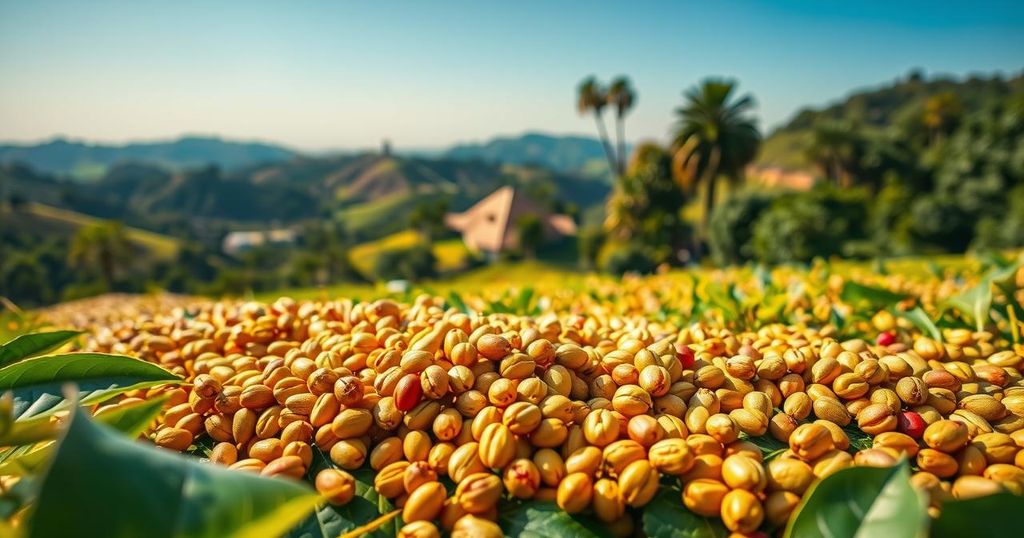Arabica Coffee Prices Supported by Brazil’s Dry Weather Effects
Arabica coffee prices rose due to dry weather in Brazil, with mixed trends in robusta coffee influenced by expected rainfall in Vietnam. Falling inventories and advanced sales in Brazil bolster price support. Supply fears persist amid projections of production deficits for upcoming years due to ongoing adverse weather conditions affecting key coffee-producing regions.
The recent trends in Arabica coffee prices demonstrate notable fluctuations influenced by weather conditions in Brazil. On Wednesday, May arabica coffee closed at an increase of 2.90%, marking a two-week high. Meanwhile, robusta coffee experienced a slight decline due to expectations of rainfall in Vietnam, which is anticipated to enhance soil moisture and support robusta yield.
According to Somar Meteorologia, Brazil’s coffee crop faces ongoing risks from dry and hot weather, particularly impacting the final stages of coffee development ahead of the upcoming harvest. The dry conditions contrast sharply with the improving outlook for robusta coffee, as Vietnam’s weather forecast indicates increased rainfall over the coming week, which could bolster its production significantly.
Brazil’s major arabica coffee-producing region, Minas Gerais, reported receiving only 24% of its historical average rainfall, which may detrimentally affect yields. In light of these adverse weather conditions, persistent low inventory levels contribute to the upward pressure on coffee prices, as evidenced by the declines in ICE-monitored inventories across both robusta and arabica varieties.
Encouragingly, a higher percentage of Brazil’s coffee harvest has been sold already, with data indicating that 88% of the 2024/25 harvest was sold by February 11, compared to 79% in the previous year. Conversely, sales for the following crop year lag significantly, suggesting an anticipated supply shortage.
Supply concerns are further compounded by a projected drop in Brazil’s coffee exports. According to Cecafe, there was a 1.6% year-on-year decrease in green coffee exports in January 2023, aligning with projections of reduced coffee production due to ongoing severe weather conditions affecting the region. Notable drops in production were also reported for Colombia, the second largest arabica producer, which is similarly affected by climate factors.
Robusta coffee pricing is currently influenced by a reduction in Vietnamese output, expected to remain at the lowest levels in four years due to preceding droughts. Meanwhile, despite reports of improved coffee exports from Brazil and Vietnam, observations from the International Coffee Organization show a decline in global coffee exports significant enough to impact pricing.
The USDA’s latest reports suggest an overall increase in coffee production globally for 2024/25, albeit with diminishing ending stocks, indicating potential price supports. It is crucial to note the assessment of future production deficits in both Brazil and globally, as projections indicate a progressive worsening of supply dynamics for the subsequent marketing years.
Analyses from Volcafe and other sources reveal an estimated coffee balance and potential production deficits reflecting long-term challenges exacerbated by climate conditions. In conclusion, current market dynamics suggest that Arabica coffee prices are likely to remain supported due to ongoing weather-related factors and shifting regional outputs, determining trade trends in the near future.
In summary, Arabica coffee prices are being significantly influenced by adverse weather conditions in Brazil, which threaten upcoming crop yields. Concurrently, robusta coffee’s outlook appears more favorable with anticipated rainfall in Vietnam. Additionally, diminishing inventory levels and increased sales of the current harvest in Brazil present further implications for market dynamics and supply issues. The coffee market is expected to face potential production deficits, leading to sustained price pressures well into future marketing years, raising critical supply concerns.
Original Source: www.tradingview.com




Post Comment